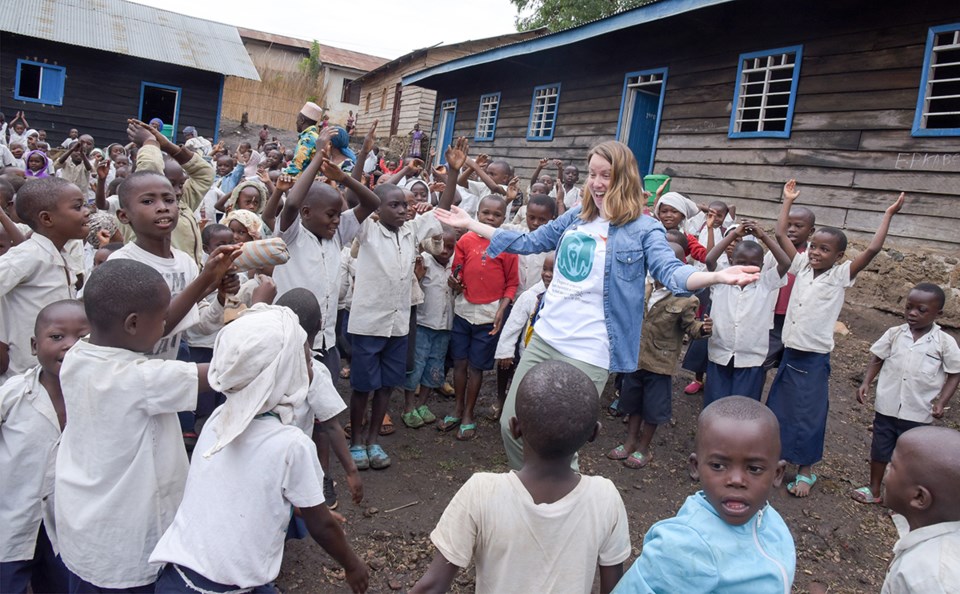Cathy Dobson
Sarnia’s Anne-Marie Connor is a front-line worker half way around the world in a country faced with two unprecedented health emergencies.
Simultaneous outbreaks of Ebola and COVID-19 have struck fear in the Democratic Republic of Congo (DRC) where Connor, 40, is executive director of World Vision.
“But I’m lucky enough to have the opportunity to make a difference, so I can’t complain,” she told The Journal from Africa.
When the Canadian government put out the call for all citizens to repatriate, Connor and her Toronto-born husband debated whether to leave or ride out the outbreaks in Kinshasa, a densely populated city of 12 million.
“The Canadian embassy organized a flight leaving at the beginning of April,” she said. “We decided to stay for a number of reasons, most importantly morale (of her 500 employees).
“Staying with the team and being available to them in real time is really important to me.”
The DRC had 1,500 Canadians registered in March. Connor and husband Ryan O’Neill are among 150 still there.
Connor said she hasn’t left her house in a month, not since the first cases of COVID-19 were recorded in Kinshasa.
“In being here, I still have a better sense of the situation, the mood and context than I would if I was in Canada,” she said. “Living the crisis is helping me understand what the team needs and the challenges they face.”
World Vision humanitarian aid has provided water, food, supplies and education since the Ebola epidemic began in August 2018.
Twenty months later, Ebola has killed 2,200 people in DRC. But officials say the use of unlicensed vaccines has all but stopped the virus.
Connor was ready to join front-line workers across the country on April 13 in celebrating the end of the epidemic when several new patients fell ill.
“There’s no break for health and community workers who now have to battle two of the world’s most feared health crises within the same borders,” she said.
“We didn’t stop working as we knew there was always a chance that the outbreak would start again, so we will scale up our response right away.”
Connor said she is deeply concerned about impoverished people in the Congo who must choose between social distancing and feeding their families every day.
“The other thing to know is the impact this will have on kids,” she said. “We know that the actual virus doesn't seem to be deadly for them. That's good news. But because of hospitals and clinics being overwhelmed, kids are less likely to get treatment for child killers like malaria, measles or malnutrition.
“So even though we absolutely must tackle COVID we can't forget about responding to other health crises.”
There is a serious shortage of PPE in the DRC. And with only 65 ventilators in a country of 80 million people, doctors can do little for critical cases, Connor said.
“So if people do get very ill they will almost certainly die. Certainly there's some hope that with a very young population the outbreak will be less deadly but that's impossible to predict at this point,” she said.
World Vision intends to ramp up education in the hope of stopping the virus from spreading, she said. Lessons learned in the battle against Ebola can be applied to COVID-19.
In a country where distrust of aid workers runs deep, World Vision has had success by training community religious leaders to teach families to protect themselves from Ebola. Those same leaders are being educated about COVID-19 so people will learn about hygiene and social distancing in their own language from people they trust.
Connor is the daughter of Madeleine and Dr. Ian Connor of Sarnia. She graduated from St. Patrick’s/St. Christopher’s and studied political science and international development at the University of Ottawa, then earned a Master’s at the University of Guelph.
She has worked with World Vision in Africa since graduation.
“We come home every summer,” she said. “Sadly, it seems a long shot at this point and that’s tough. We love those visits and the anticipation keeps us going, knowing we’ll have a break.
“But luckily we’re very healthy and safe,” she added.
